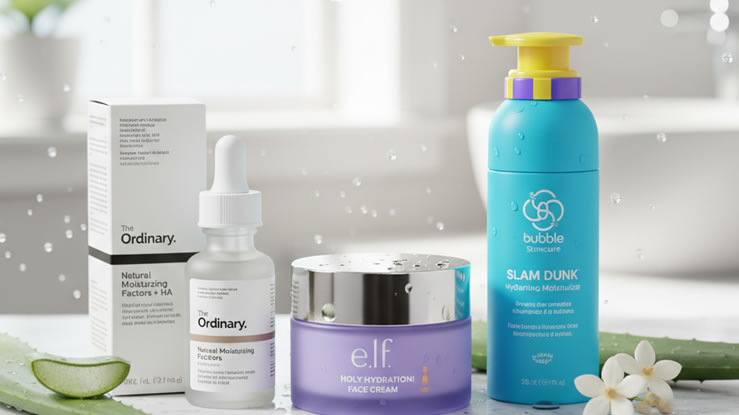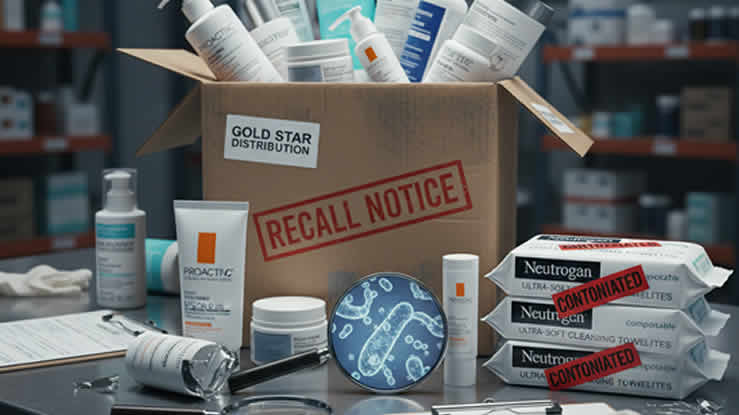The skin barrier is your body’s first line of defense against external aggressors while keeping essential moisture inside. It acts like a wall made of skin cells held together by a mixture of lipids such as ceramides, cholesterol, and fatty acids. When the barrier is strong, your skin stays hydrated, smooth, and protected from environmental stress.
The outermost layer of the skin, called the stratum corneum, plays the main role in this defense. Its purpose is to keep harmful elements out and vital moisture in. It helps maintain the skin’s slightly acidic pH, known as the acid mantle, which supports the growth of healthy bacteria and prevents infection. A well-functioning barrier keeps your skin resilient and balanced, while a weakened one can lead to dryness, redness, irritation, and sensitivity.
Building a strong skin barrier is not only about having radiant skin but also about ensuring the long-term health and function of your skin.
What Damages the Skin Barrier
Understanding what harms your skin barrier helps you protect it. Many daily habits, environmental conditions, and lifestyle choices can damage this delicate structure.
Common causes include using harsh soaps or cleansers, washing with hot water, over-exfoliating, and applying too many active skincare products. Environmental stressors like extreme weather, pollution, and UV radiation can also break down the protective lipids in the barrier. Additionally, dehydration, poor diet, smoking, lack of sleep, and high stress levels interfere with skin repair and weaken its defenses. When the skin barrier is compromised, you may notice dryness, flakiness, itchiness, redness, and tightness. Some people experience stinging or burning sensations after applying skincare products. Others see more breakouts or dull, rough texture. These are all signs your barrier needs repair.
How to Build and Rebuild Your Skin Barrier
Rebuilding your skin barrier requires patience and consistency. The process involves gentle care, replenishing lost lipids, keeping hydration levels stable, and avoiding triggers that cause irritation.
1. Use a Gentle Cleanser
Cleansing should never strip your skin of its natural oils. Choose a mild, pH-balanced cleanser designed for sensitive or dry skin. Wash your face with lukewarm water rather than hot, and avoid using rough washcloths or brushes. If your skin feels tight after cleansing, the product is likely too harsh.
2. Restore Lipids and Moisture
After cleansing, focus on replenishing the skin’s natural lipids. Look for products that contain ceramides, cholesterol, and fatty acids. These ingredients work together to rebuild the barrier’s structural integrity. You can also use moisturizers containing glycerin or hyaluronic acid to attract and hold moisture within the skin.
For extremely dry or damaged skin, choose thicker creams or ointments rather than lightweight gels. Applying moisturizer while your skin is still slightly damp helps lock in hydration more effectively
3. Add Barrier-Supporting Ingredients
Certain ingredients can strengthen the skin barrier over time. Niacinamide, a form of vitamin B3, enhances lipid production and improves skin texture. Panthenol (vitamin B5) soothes and hydrates. Natural oils like jojoba, sunflower, and squalane mimic the skin’s sebum and reinforce the barrier.
When rebuilding your barrier, avoid strong exfoliating acids and retinoids until your skin feels comfortable again. Once your barrier has improved, you can slowly reintroduce them, one at a time, while monitoring for sensitivity.
4. Protect from Environmental Damage
Sun exposure is one of the biggest threats to your skin barrier. UV radiation degrades essential lipids and proteins, causing long-term weakness and premature aging. Use broad-spectrum sunscreen with at least SPF 30 every day, even when it is cloudy or you stay indoors.
In dry or cold climates, consider using a humidifier to maintain indoor moisture levels. If you spend time outdoors in harsh weather, apply a thicker protective layer of moisturizer to act as a physical shield.
5. Simplify Your Routine
Overloading your skin with multiple active ingredients can cause imbalance and irritation. Stick to a minimalist skincare routine when repairing your barrier. Focus on three essentials: a gentle cleanser, a barrier-repairing moisturizer, and a sunscreen. Once your skin stabilizes, you can gradually add targeted treatments if needed.
6. Support Your Skin from Within
Your skin barrier is influenced by your overall health. Staying hydrated, managing stress, and eating a balanced diet rich in healthy fats can make a significant difference. Foods like salmon, walnuts, flaxseeds, and avocados contain omega-3 fatty acids that support the skin’s lipid layer.
Antioxidant-rich foods such as berries, leafy greens, and nuts protect skin cells from oxidative damage. Regular sleep allows the body to repair itself, including the skin. Aim for seven to eight hours of rest each night for optimal recovery.
A Sample Weekly Routine for Rebuilding the Barrier
Morning
Cleanse your skin gently using lukewarm water.
Apply a hydrating serum with hyaluronic acid or glycerin.
Use a ceramide or niacinamide-based moisturizer to strengthen the barrier.
Finish with a broad-spectrum sunscreen of SPF 30 or higher.
Evening
Cleanse again with a gentle formula.
If your skin feels very dry, apply a rich night cream or a layer of facial oil.
Avoid exfoliants, acids, or retinoids while your barrier heals.
You can use a simple occlusive like petroleum jelly or a heavy cream to seal moisture overnight.
Weekly Adjustments
Limit exfoliation to once a week with a mild product such as a low-strength lactic acid or PHA, but only when your skin is comfortable.Use soft towels and avoid rubbing the skin harshly.
If redness or irritation persists, take a break from all actives for at least two weeks.
Within three to four weeks of following this gentle approach, your skin should feel smoother, more supple, and less irritated.
Common Mistakes to Avoid
Over-exfoliation is one of the leading causes of barrier damage. While exfoliation can remove dead skin cells, doing it too often strips away the protective lipid layer. Limit exfoliation to once weekly or pause completely if your skin feels tight or stings after cleansing.
Using too many actives like retinoids, vitamin C, and strong acids all at once overwhelms the skin. Introduce new products slowly and one at a time.
Ignoring sunscreen allows UV damage to undo your progress. Daily protection is essential even when indoors.
Choosing fragranced or alcohol-heavy products can trigger irritation. Fragrance-free and alcohol-free formulas are best for sensitive or compromised skin
Neglecting hydration and sleep can delay barrier recovery. The skin heals and regenerates best when the body is well-hydrated and rested.
How Long It Takes to Rebuild the Skin Barrier
Healing time varies from person to person. Minor barrier damage from over-cleansing or mild dryness may improve within three to four weeks of consistent care. Severe cases caused by long-term overuse of harsh products or medical conditions like eczema may take two to three months. The key is patience. Skin renewal takes time, and rushing the process with aggressive treatments can cause setbacks. Gentle consistency always wins.
Additional Tips and Helpful Ingredients
- Plant oils like jojoba, sunflower, and argan mimic the natural sebum in your skin and provide essential fatty acids that strengthen the barrier.
- Omega-3 supplements support hydration and reduce inflammation internally.
- Probiotics and prebiotics may help balance the skin microbiome, which supports the outer barrier.
- Humidifiers add moisture to indoor air, reducing dryness and irritation during cold or dry seasons.
- Patch testing new skincare products before full use can prevent unwanted reactions.
Always listen to your skin. If it feels tight, stings, or burns, it means your barrier needs a break. Scale back to the basics: cleanse, moisturize, and protect.
Lifestyle Habits That Strengthen the Barrier
- Stay hydrated by drinking water throughout the day.
- Eat a balanced diet rich in fruits, vegetables, and healthy fats.
- Avoid smoking and excessive alcohol, both of which dehydrate and damage skin.
- Manage stress with relaxation techniques like meditation, exercise, or breathing exercises.
- Get enough sleep for proper skin regeneration.
Small daily habits make a significant impact on skin health. Over time, these efforts create stronger, more resilient skin.
Understanding the Role of the Acid Mantle
The skin’s acid mantle is a thin film of sweat, oils, and natural acids that keeps the surface slightly acidic. This mild acidity discourages the growth of harmful bacteria and supports the good ones.
When harsh soaps or alkaline cleansers disrupt this balance, the skin becomes vulnerable to infections, inflammation, and moisture loss. Maintaining the correct pH through gentle, pH-balanced products is crucial for a healthy barrier.
The Science of Skin Barrier Repair
Skin barrier repair happens through the restoration of lipids and cellular renewal. The body produces natural ceramides, cholesterol, and fatty acids, but external factors can deplete them faster than the body can replace them.
Moisturizers containing these components supplement the skin’s own repair process. Niacinamide boosts lipid synthesis, while hyaluronic acid improves water retention. Regular use helps the outer layer rebuild its integrity and regain its protective function.
Maintaining Your Barrier Long-Term
Once your skin barrier is healthy again, maintaining it becomes easier. Continue using gentle cleansers, moisturizing daily, and protecting from the sun. Avoid experimenting with too many new products at once.
Consistency is key to keeping your skin balanced and radiant. Even after recovery, keep exfoliation moderate and maintain your lifestyle habits that support hydration and nutrition.
Building a strong skin barrier is the foundation of any routine. It is the difference between temporary improvement and lasting skin health. A balanced approach gentle cleansing, smart hydration, protection, and supportive nutrition allows your skin to thrive naturally. Your skin barrier is not something to fix overnight but to nurture continuously. Respect your skin’s needs, protect it from harsh conditions, and feed it with what it needs inside and out. With time, patience, and care, your skin will reward you with resilience, radiance, and lasting health.



















